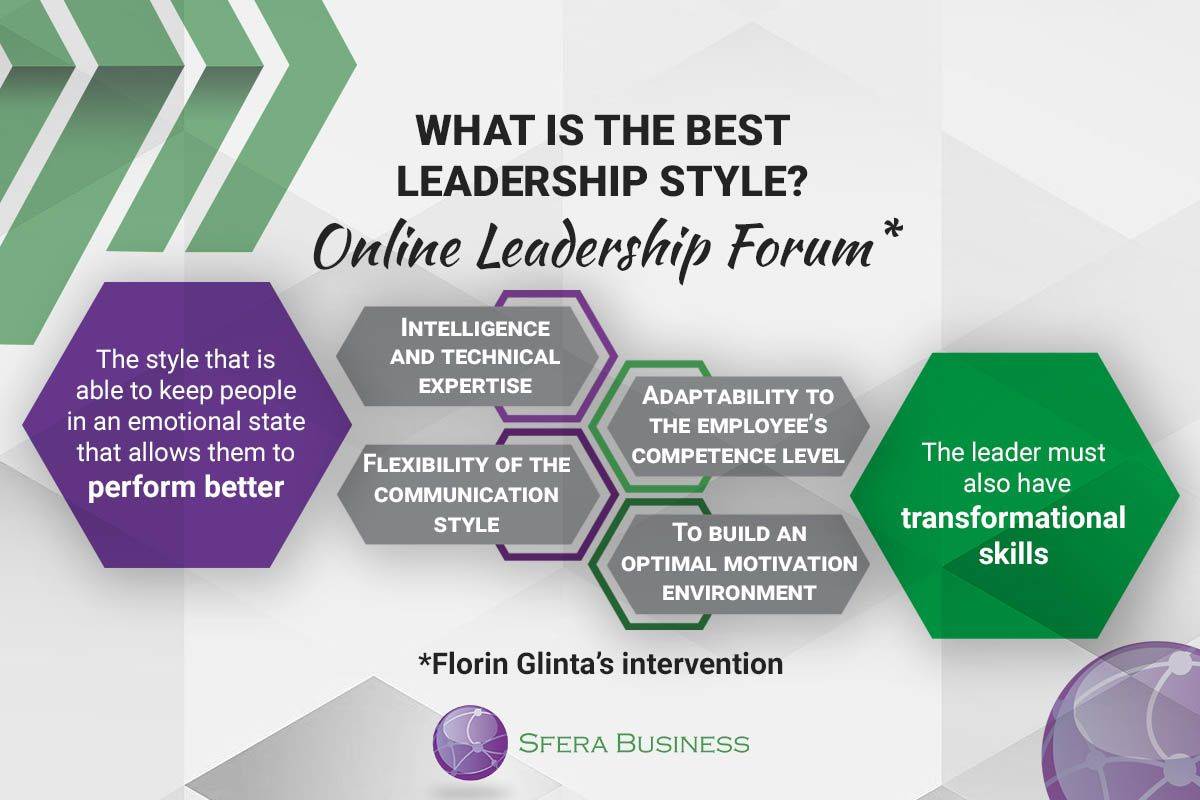– Ioana Hincu
Florin Glinta is a Psychologist, Senior Trainer & Consultant, and Partner at Sfera Business. In 2012 he started delivering training programs, in which he combines the results of relevant empirical studies made in real organizations and his own metrics or tools built to make it easier for participants to understand their qualities and the concrete steps they can take to develop them.
Florin has delivered complex development programs in areas such as stress management, managerial communication and team development, managerial roles, feedback and coaching, etc.
At the Online Leadership Forum, an event organized by Sfera Business, Florin Glinta talked about the best leadership style, as seen through the eyes of an expert in organizational psychology.
“When you say the best leadership style, it’s important to think about criteria. The best style for what? for whom? in regards to what? Of the multiple criteria that we can use to determine the best style, we have chosen to use a somewhat softer one in the program that we run: Online Leadership Academy. This approach is tied to our beliefs at Sfera Business because it comes from the emotional area.
Putting the conclusion first, we think that the best leadership style is that one that is capable of putting and keeping people in an emotional state that allows them to perform better, in a well-being state, that would keep their focus on performance and not on something else. […]
We think of organizations as fields of a dispute between two big forces. At the level of every person in the organization, there are two forces that press us and that dispute their supremacy. Depending on which one is winning conjecturally and contextually, we feel two very different emotions.

This is the stress model: if there’s a bit of pressure it’s ok as long as you have the resources to deal with it. If you can answer positively to the question ‘can I deal with it?’ it’s ok.
This model comes from the research area of occupational stress, and what is important to know is that every person, in any circumstances, at any job, will feel two things. The first one is that they are subject to some requirements – that means they have easier or more complicated tasks to do, some expectations of their managers to meet, and they have to respond to some performance standards. All of these are grouped into what we call demands and have the potential to stress us if they become too intense. At this point, we ask ourselves: more intense than what? More intense than the other force that we call resources.
This is the stress model: if there’s a bit of pressure it’s ok as long as you have the resources to deal with it. If you can answer positively to the question ‘can I deal with it?’ it’s ok. It’s like in sports – it motivates you, it helps you be better, perform better.”
“Resources include a lot of features. Let’s focus on the circumstantial ones: requirements or characteristics that are part of the job – how much control you have on the job, whether or not you can decide certain things regarding how to do your job, like your working time, your work pace, the procedure, how much decision autonomy you have and so on.”

The winning equation is when you give significantly more resources than demands, but keep the latter at a high level too.
“We were talking earlier about the congruence of values – it’s an essential resource for any person who has to meet some requirements – how much feedback we get from our managers, how much support we get. Why is it important and I bring leadership to this discussion? Because managers, leaders, influencers have the possibility to influence this balance. If demands are much higher than resources, we should know that anyone, in any circumstances, will not just feel discomfort, if this becomes chronic in the long run, we will feel burnout – we’re exhausted, tired, cynical, we no longer like the organization, we no longer believe in what our managers tell us and we may even get to depersonalization. We, as managers, and depending on our management style, have the possibility to reverse this balance, to make resources even bigger. But pay attention not to lower the requirements too much – it’s one of the current management traps. The winning equation is when you give significantly more resources than demands, but keep the latter at a high level too. You build this emotion that we call engagement and that, measured, means that you as a person feel having a lot of energy in your workplace, you feel very committed, you find meaning in what you do, you don’t even notice when time flies when you do your job. This is a good state that leads to organizational performance.”
Florin ended his presentation with a “recipe”, some elements that represent the essence of “good” leadership!
- Intelligence and technical expertise: to lead means to manage information and to make decisions under specific complexity.
- Adaptability to the competence level of the employee: the right tools for a “rookie” can be frustrating for an “expert”.
- Flexibility of the communication style: the messages sent from your relationship style are not effective for other styles.
- To build an environment of optimal motivation: a customized and continuous approach, done with individual consideration.
- A transformational flavour cannot be missing!
We are glad that Florin is part of Sfera Business team and we thank him for his participation at the Online Leadership Forum, an event organized by Sfera Business on the occasion of the launch of Online Leadership Academy, a program he has worked on recently, that brings useful and practical concepts for participants to learn and develop essential leadership skills. For more details, please go to the following link:

